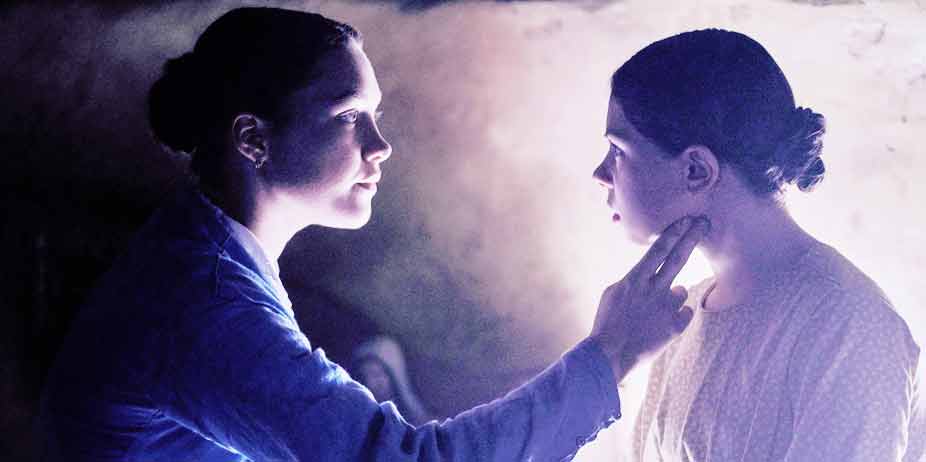
The Wonder (2022)
A fascinating story carrying large themes on its shoulders, The Wonder is an imperfect but memorable piece of unique storytelling.
English Nurse Lib Wright (Florence Pugh) receives her instructions once she reaches the remote landscape of Ireland: you are here to observe, but not to interfere. A local council of curious men has brought her and a nun to the small community to discern whether a miracle is taking place in their midst. Anna (Kila Lord Cassidy) has not eaten for weeks, and claims she gets fed by manna from heaven. Being a woman of scientific methods, Lib raises her brow at that, but agrees to undertake an examination and an investigation. She watches Anna for days, confused as to how she is getting her food. Anna has also drawn curious onlookers to the house, some of whom leave offerings in the poor box. There seems to be no financial incentive for the family to encourage this behavior, and the devout Anna persists in it even when she starts looking a little too thin for the nurse's taste.
Before long, a journalist named Will Byrne (Tom Burke) comes to town, determined to somehow prove that this is all a hoax. He and Anna soon become fond of each other, through their shared tragedies of losing loved ones, but Anna finds it harder and harder to stand by and do nothing, while she watches Anna waste away in front of her. The girl refuses to eat, her mother refuses to ask her to eat, and Anna doesn't know what to do, or what's behind it... until a confession brings it all to light. And then she faces a terrible choice.
I haven't read the book that inspired this film, but I understand it is atmospheric and slow-moving. The movie manages to be the former, without too much of the latter. There are many quiet moments where characters sit and think or eat (symbolically, Lib choosing life with each spoonful, contrasted with Anna choosing death with each refusal), but the story is a tight two hours and it has a satisfying ending. It worried me there for a while, but the conclusion is a good payoff to the emotional investment of the story. It's also painted a few years after the Irish famine, in which thousands of people died, which gives the story some historic weight. There were similar accounts at the time of fasting girls or those who insisted God was feeding them--all either revealed to be hoaxes or leading to the death of these children. And it's hard to talk about the motivations without revealing spoilers, but they are weighty -- about sin, atonement, and punishment. If you don't wish to have the twist spoiled, skip the next paragraph.
Lib finds out midway through the story that Anna was sexually molested by her brother, who took her as his "wife." Her mother blames her for this sin, and for his subsequent death (Anna thinks God punished him, and he is burning in hell). Anna has been so entrenched in Catholicism that she thinks she must die to free his soul from hell; that every hour she prays and goes without food is one less hour he has to spend in hell. She is the victim, who is then victimized by her faith and her mother, who blames her for having "seduced" her brother at age nine. There's no sympathy for her from anyone, including the Catholic priests who preside over her starvation (insisting it's a miracle and that Lib must not intervene). You could read this as an attack on Catholicism, or merely as a story being told about the great dangers of a religious belief of any kind that makes no allowance for compassion and forgiveness.
The performances here are stirring. Florence Pugh is very good in these kinds of roles -- she brings an emotional weight to them where more gets said in a pause or a look than with her words, and Lib is a fine character to play as well, a woman of few words and endless stoicism, but who becomes increasingly angry with what she sees happening around her, and the total passivity of all involved in not caring to do anything about it. She's a complex woman--intelligent but compassionate, and fraught with pain over her child's death. She turns to morphine as a release, taking it and pricking her finger for a drop of blood before spending hours senseless in her bed. The ending is quite clever, and how Anna figures out what to do is surprisingly wonderful. If there's one complaint I had, it's the sex scene that comes out of nowhere and doesn't seem to do anything to help the plot other than to tell us that she and Will are now involved. I guess their romance takes longer in the book, but because they had to tell a story in two hours, they took a more modern hookup approach. Illicit sexual encounters did happen in the past (and had consequences), but it doesn't seem to suit the mood of this story, or her particular situation (where any hint of impropriety could lose her the position, if bandied about the little town).
Though it handles some unpleasant thematic elements (child molestation and wanton neglect), it usually does so with tact and leaves the audience full of hope, and for that, it's worth seeing.
Sexual Content:
A woman pleasures herself under the covers; an unmarried
couple has clothed sex (movement, breathing, she thanks him afterward). Spoiler.
We find out a girl has been molested by her brother (she calls it "being his
wife") and that drives much of the action in the second half of the film.
Violence:
None other than a girl starving herself to death and
spitting up vomit; a house burns down.
Other:
A main character is a drug user, who takes morphine to avoid the pain of her loss.
